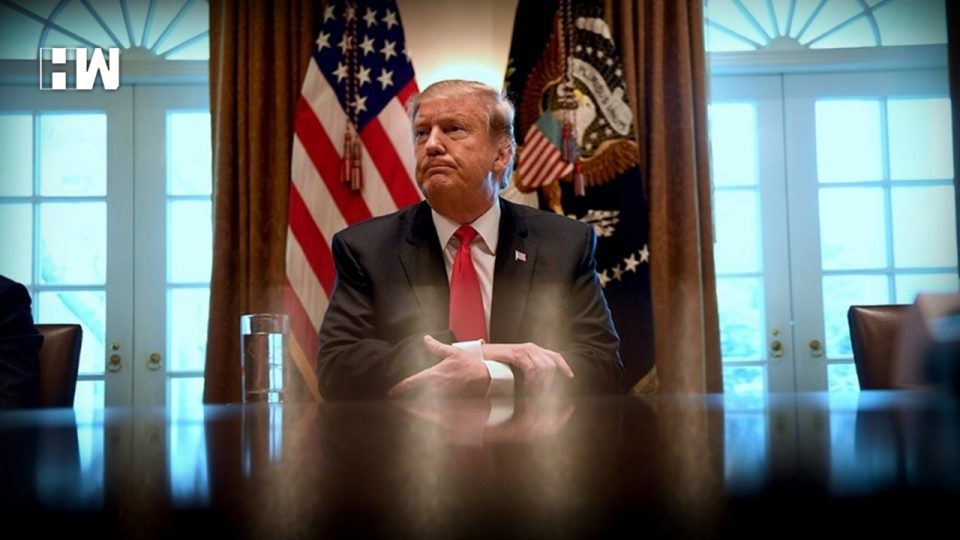Washington | US President Donald Trump rejected Tehran’s denial it was behind mysterious explosions on two oil tankers in the Gulf of Oman, saying the incident had Iran “written all over it”.
As US-Iranian tensions soared, Trump dismissed previous threats by Tehran that in case of conflict it could block the Hormuz Strait — a narrow seaway vital to the world’s oil supplies.
“They’re not going to be closing it,” he said in an interview on Fox News television.
Speaking hours after the US military released grainy footage it said showed an Iranian patrol boat removing an “unexploded limpet mine” from one of the tankers, Trump was emphatic.
“Iran did do it,” Trump told the “Fox and Friends” show.
“You know they did it because you saw the boat. I guess one of the mines didn’t explode and it’s probably got essentially Iran written all over it. You saw the boat at night, successfully trying to take the mine off — and that was exposed,” he added.
Iran rejects the US accusations. It labelled the attacks “suspicious” as Iran’s supreme leader Ayatollah Ali Khamenei rebuffed overtures by Japanese Prime Minister Shinzo Abe to open talks with Trump.
Iranian Foreign Minister Mohammad Javad Zarif tweeted that the US had “immediately jumped to make allegations against Iran without a shred of factual or circumstantial evidence.” He accused Washington of seeking to “sabotage diplomacy” as Abe visited Iran.
One of the targeted vessels is owned by a Japanese company while the other was Norwegian-operated.
Iran has repeatedly warned in the past that it could block the Hormuz Strait in a relatively low-tech, high-impact countermeasure to any attack by the US.
Doing so, would disrupt traffic of oil tankers between the Persian Gulf and the Gulf of Oman, which leads to the Indian Ocean and global export routes.
“If the hostility of enemies increase, we will be able to do so,” Iran’s armed forces chief of staff, Mohammad Bagheri, told semi-official ISNA in April.
Trump played down the threat.
“It’s not going to be closed, it’s not going to be closed for long and they know it. They’ve been told in very strong terms,” Trump told Fox News.
Oil prices have surged in response to the geopolitical tension.
Saudi Arabia’s energy minister Khalid al-Falih said the kingdom was monitoring the situation with “great concern,” the Saudi SPA news agency said.
Al-Falih “called upon the international community to assume its joint responsibility and take firm action to secure maritime traffic in the region’s waterways.” Saudi Arabia, a close US ally, is a bitter regional rival of Iran.
China called for all sides to “resolve the conflict through dialogue,” while the European Union called for “maximum restraint.”
Russia, which has close, even if sometimes strained links to Iran, warned through its foreign ministry against “hasty conclusions.”
The oil tankers that came under attack were 10 nautical miles apart and headed to Asia when they were struck by explosions in the early daylight hours Thursday after passing through the Strait of Hormuz some 25 nautical miles off Iran’s southern coast.
The Front Altair carrying naphtha, a refined petroleum product, and owned by the Oslo-listed company Frontline was hit by three explosions, according to Norwegian officials, and remained ablaze into Thursday.
Explosions also struck the Japanese-owned Kokuka Courageous, which was loaded with methanol, but the fire on board was soon extinguished. One crew member suffered minor injuries and the ship was on Friday heading towards the UAE port of Khor Fakkan.
There was no claim of responsibility for the blasts, which struck both tankers at the waterline.
Iran said its navy rescued several dozen crew members from the two vessels, while the US Navy said it had picked up 21 from the Kokuka Courageous.
Iran’s English-language Press TV aired footage of rescued crewmen from the Front Altair, saying they are all in “full health.” “Everything is OK,” said one of the vessel’s “chief officers”, presenting himself as Russian and thanking Iran for its “hospitality.”
Press TV said 11 of the crew were Russian, 11 Filipino and one Georgian.
The crew of the Japanese-owned Kokuka Courageous saw a “flying object” before a second blast on board, the operator’s head said Friday.
Washington has dispatched the destroyer USS Mason to the scene “to provide assistance,” CENTCOM said in a statement while Oman said it sent two navy vessels to assist.
US Secretary of State Mike Pompeo said Thursday’s tanker explosions were “the latest in a series of attacks” he blamed on Iran or its “proxies”, including Yemeni rebel missile strikes which wounded 26 civilians at a Saudi airport on Wednesday.
A Saudi-led coalition which is fighting the rebels it accuses of being Iranian proxies said its air defences had intercepted a new rebel attack on an airport in the Islamic kingdom on Friday.
The US has also accused Iran over May 12 attacks on four tankers anchored in the Gulf of Oman off the United Arab Emirates port of Fujairah.
The preliminary findings of a five-nation investigation indicated a state actor was responsible but stopped short of naming Iran.
The US called Thursday for the UNSC to confront the “clear threat” posed by Iran.
Iranian President Hassan Rouhani meanwhile called the US a “serious threat to global stability” as he attended an international forum in Kyrgyzstan.
As an independent media platform, we do not take advertisements from governments and corporate houses. It is you, our readers, who have supported us on our journey to do honest and unbiased journalism. Please contribute, so that we can continue to do the same in future.

